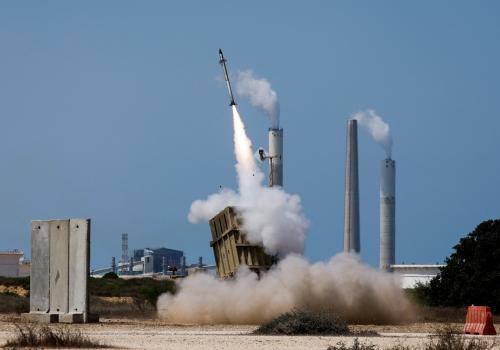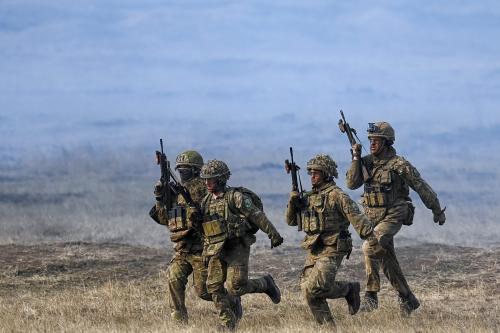Editor’s note: In this blog, Yun Sun examines the Xi Jinping administration’s new engagement with Africa during the first year since his inauguration. For a more detailed look at the evolving relationship between China and Africa, read Sun’s latest paper,
Africa in China’s Foreign Policy
.
It has been more than a year since Xi Jinping’s inauguration as China’s new president in March 2013 and his unprecedented visit to Africa in his first overseas trip as the head of state. During the first year of the Xi administration, China’s policy toward Africa has shown several new trends that illustrate Beijing’s evolving priorities and strategies in the continent. These new trends foreseeably will have significant implications for the future of Africa and Sino-Africa relations.
Peace and Security in Africa
Most strikingly, China under Xi has greatly and assertively enhanced its direct involvement in Africa’s security affairs. Two months into Xi’s reign, Beijing unprecedentedly dispatched 170 combat troops from the People’s Liberation Army’s (PLA) Special Force to the United Nations peacekeeping mission in Mali. Compared with China’s past tradition of dispatching only non-combat staff such as engineers and medical personnel, this is the first time China sent “combat troops” to a foreign country under a U.N. mandate. It remains to be seen whether the move changes PLA’s tacit operating principle of “no troops on foreign soil” given the U.N. authorization and local government consent. Nevertheless, China’s choosing Africa to dispatch combat troops for the first time does suggest Beijing’s rising interests, enhanced commitment and direct role in maintaining peace and security of Africa.
In another unprecedented but more surprising move, China under Xi engaged in open intervention in the South Sudan conflict through direct mediation. In 2013, China’s special envoy for African affairs, Ambassador Zhong Jianhua, paid more than 10 visits to Africa to coordinate positions and mediate the South Sudan issue. Then, in January 2014, in a rare overt political intervention, Chinese Foreign Minister Wang Yi publicly called for an immediate end of hostilities in South Sudan. At Ethiopia’s invitation, Wang Yi traveled to Addis Ababa to meet with rebel and government delegations. He openly urged “immediate cessation of hostilities and violence,” and publicly called for the international powers to back the Ethiopian-led mediation efforts. Given China’s considerable oil stake in the unstable South Sudan (China imported nearly 14 million barrels of oil from South Sudan in the first 10 months of 2013, twice that from Nigeria), many believe that China is gradually abandoning its long-term “non-interference” principle to protect its overseas economic interests.
Under Xi Jinping, China has continued its naval escort missions in the Gulf of Aden but enhanced security cooperation with the Djibouti government throughout the process. China has dispatched a total of 16 fleets and escorted more than 5,300 ships and vessels in the area. Chinese missions have been carried out under a clear U.N. mandate. However, through these missions, China has been developing naval cooperation with Djibouti on such matters as local logistical supplies and emergency assistance. In his latest visit of Africa at the beginning of 2014, Foreign Minister Wang sang high praise for the “convenience” Djibouti had provided and called for “more stable and long-term” security cooperation with the country in this regard.
China’s increasing direct involvement in the peace and security affairs of Africa is also reflected in its rising financial and military contribution to the regional organization—the African Union (AU)—to boost its security role in the continent. In 2013, China provided $1 million in assistance to the AU to support its mediation and coordination efforts in the Mali conflict. It has also provided military material assistance to African countries involved in the AU peacekeeping missions under the same framework.
China’s rising involvement in Africa’s security affairs is motivated by multiple considerations. Most importantly, the instability and conflicts in Africa have increasingly become a direct challenge to China’s economic presence in Africa. China learned the bitter, expensive lesson of its own inaction in the Libyan civil war in 2011, and now attempts to take initiative in preempting similar fallouts such as in South Sudan. Equally critical is President Xi Jinping’s desire to build China’s leadership role and image in the international community, and the peace and security issues in Africa are a perfect platform for such a goal. Last but not least, through working directly and closely with regional organizations and African governments, China hopes to diversify and strengthen its friendship base in Africa.
New Features of Chinese Economic Cooperation with Africa
China under Xi has expanded its financing to Africa. In a little more than a year, China has issued more than $10 billion loans to African countries, half of the promised $20 billion to be dispersed from 2013 to 2015. One striking feature of these loans lies in China’s new priority in financing infrastructure, agricultural and manufacturing industries in Africa, a strategy that shifts away from its traditional heavy investment in Africa’s extractive industries. Senior Chinese officials now claim that China’s investment in African energy sector makes up only 20 percent of China’s total investment in Africa.
China is strengthening its cooperation with African countries on building their manufacturing industries. In the case of Ethiopia, the country has tried to become the center for manufacturing in Africa based on Chinese investment. This would serve to upgrade China’s own position in the global supply chain and transfer its declining industries to Africa, which is eager for industrialization. This does not necessarily indicate China’s abandonment of the energy and natural resources Africa has to offer, but it does suggest that China is trying to diversify its investment portfolio in Africa in pursuit of new growth models and defusing wide criticisms on China’s “exploitation” of African resources.
Diversifying Chinese-African Political Relations
In separate strategy to improve China’s image in Africa, the Xi administration has significantly enhanced China’s public diplomacy efforts on the ground. Senior Chinese diplomats are now eagerly engaging African media to explain and propagate China’s positions and their benefits to Africa. Under the “China-Africa People to People Friendship Action” plan, Chinese embassies across Africa are seeking collaborations with African nongovernmental organizations and have implemented dozens of projects. Some examples include technical training programs in Botswana with the local Gopong Support Group; material assistance in central Africa with the Central African Republic Renaissance Foundation; donations to local elementary schools in Uganda; vocational training for local unemployed youth in Cape Verde; and women’s health programs in Benin. Although these projects are primarily led and implemented by governments, they serve to diversify China’s aid models in Africa and promote the exchanges and cooperation with the civil society. They have won some loud praise from the local populations.
In its first year, China’s Xi Jinping administration has demonstrated major new and diversified policy momentum in Africa. The continent awaits more. For a more detailed look at the evolving relationship between China and Africa, please read Africa in China’s Foreign Policy.
In addition, on April 16, the Africa Growth Initiative at Brookings and the Congressional African Staff Association held an Africa Policy Dialogue on the Hill briefing with leading past and present Brookings Institution experts on China’s political and security challenges on the continent, the nature of its foreign direct investment, what Chinese activity has meant for African businesses and how the United States can maximize its investment opportunities in Africa. For a summary of the event, the audio recording or a transcript, please see here.
The Brookings Institution is committed to quality, independence, and impact.
We are supported by a diverse array of funders. In line with our values and policies, each Brookings publication represents the sole views of its author(s).



Commentary
Xi Jinping’s Africa Policy: The First Year
April 14, 2014